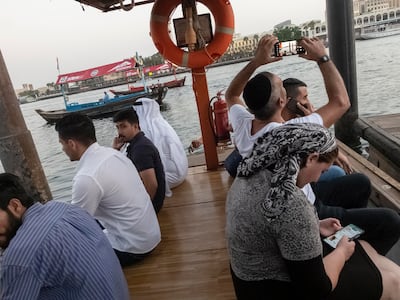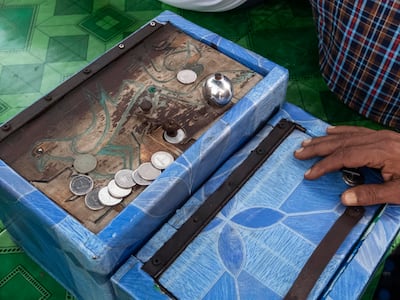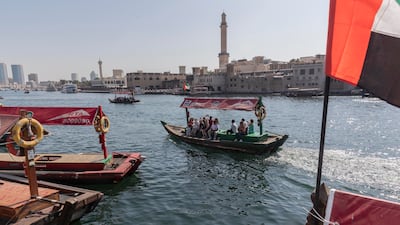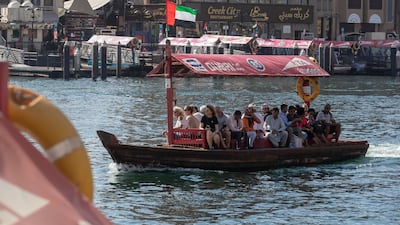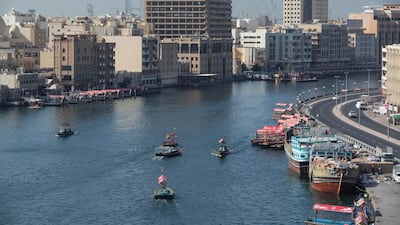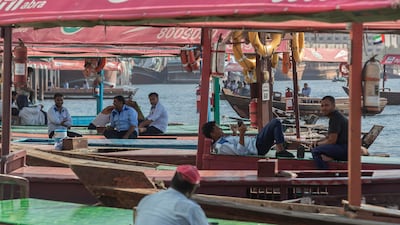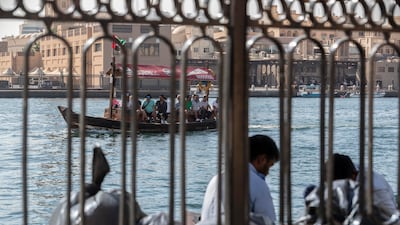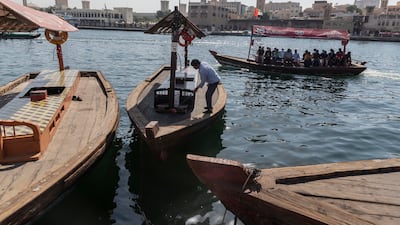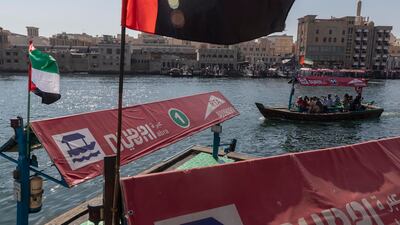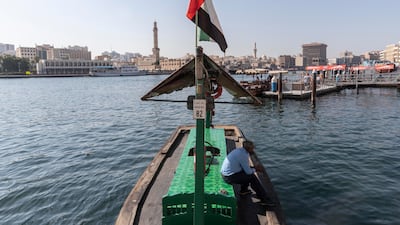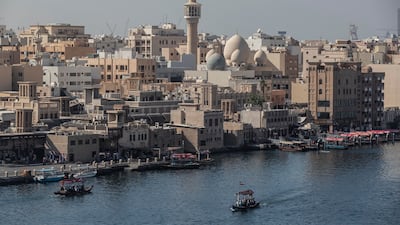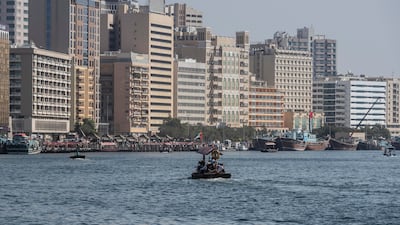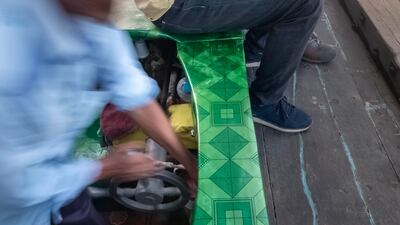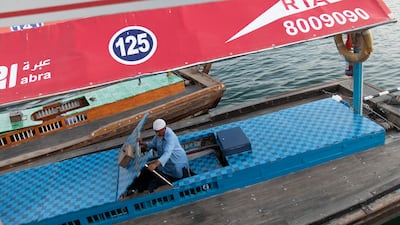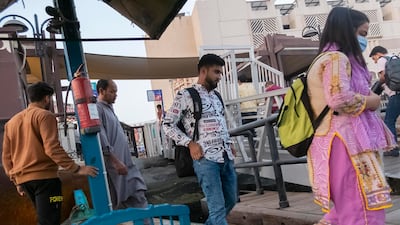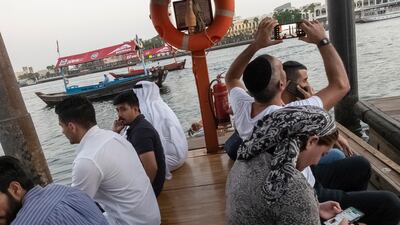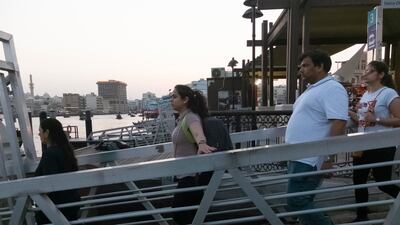For decades the main artery of Dubai was the Creek, where early inhabitants first settled and where the city's first port and pearling industry thrived.
While the emirate has expanded far beyond Old Dubai's borders since then, the waterway has remained, offering a slice of the city's history to fishermen and visitors alike.
In particular, the traditional ferry-like boats known as abras plough relentlessly across Dubai Creek to this day.
The word abra comes from the Arabic verb abara, which means "to cross", and that's exactly what these little water taxis do — take people from one side of the creek to the other every few minutes at a nominal cost (Dh1 per person, per trip).
Each abra has capacity for about 20 people and 150 boats work the routes between Deira and Bur Dubai from 6am every day. There are four stations along the creek, with the first route going from Deira Old Souq to Bur Dubai and a second, which is the busiest, going from Al Sabkha to Dubai Old Souq.
It's a unique way to get from A to B while trying to cross the emirate, without navigating the busy roads of Old Dubai, but it's also a wonderful experience for visitors, providing an alternative picture of a city that's today best known for its futuristic outlook.
The time-honoured design of these popular boats has changed little over the years, although they were overhauled to improve safety and accessibility in 2020.
Some of the changes included adding designated spaces for wheelchairs, placing life jackets under the seats and the use of GPS technology, cameras and nol card payment systems, which is also used on the Dubai Metro.
The new generation of abras are made out of African teak and measure 10.6 metres in length and about three metres wide, with a 78 horsepower diesel engine rather than the 30hp engines of yesteryear.
The new abras were part of a master plan developed by the Roads and Transport Authority to overhaul Dubai's marine transport systems, which includes boosting the number of stations in the city to 59 by 2025 and to manufacture 26 transport modes that are not just the humble abra.
"Marine transport modes have the potential to become the ideal choice of many citizens, residents and tourists who will enjoy picturesque scenes of urban and tourist facilities on both banks of the canal and along the skyline of the Arabian Gulf shores," Mattar Al Tayer, director general of the RTA, said at the time.
Dubai Creek has been a well-travelled trade network since the early 19th century, kept alive by hawkers, businessmen and artisans.
Back in the 1950s, life centred around it. Back then, Dubai was merely a town, with a population of about 20,000, with people living around Bur Dubai, Deira and Shindagha.
Vessels ploughed the Silk Route, trading goods such as wood and spices with East Africa and India, while pearling fleets left and returned from the spot during the diving season.
Our legal consultant
Name: Hassan Mohsen Elhais
Position: legal consultant with Al Rowaad Advocates and Legal Consultants.
THE BIO
Bio Box
Role Model: Sheikh Zayed, God bless his soul
Favorite book: Zayed Biography of the leader
Favorite quote: To be or not to be, that is the question, from William Shakespeare's Hamlet
Favorite food: seafood
Favorite place to travel: Lebanon
Favorite movie: Braveheart
Anxiety and work stress major factors
Anxiety, work stress and social isolation are all factors in the recogised rise in mental health problems.
A study UAE Ministry of Health researchers published in the summer also cited struggles with weight and illnesses as major contributors.
Its authors analysed a dozen separate UAE studies between 2007 and 2017. Prevalence was often higher in university students, women and in people on low incomes.
One showed 28 per cent of female students at a Dubai university reported symptoms linked to depression. Another in Al Ain found 22.2 per cent of students had depressive symptoms - five times the global average.
It said the country has made strides to address mental health problems but said: “Our review highlights the overall prevalence of depressive symptoms and depression, which may long have been overlooked."
Prof Samir Al Adawi, of the department of behavioural medicine at Sultan Qaboos University in Oman, who was not involved in the study but is a recognised expert in the Gulf, said how mental health is discussed varies significantly between cultures and nationalities.
“The problem we have in the Gulf is the cross-cultural differences and how people articulate emotional distress," said Prof Al Adawi.
“Someone will say that I have physical complaints rather than emotional complaints. This is the major problem with any discussion around depression."
Daniel Bardsley
The%20specs%20
%3Cp%3E%3Cstrong%3EEngine%3A%20%3C%2Fstrong%3E2.0-litre%204cyl%20turbo%0D%3Cbr%3E%3Cstrong%3EPower%3A%20%3C%2Fstrong%3E261hp%20at%205%2C500rpm%0D%3Cbr%3E%3Cstrong%3ETorque%3A%20%3C%2Fstrong%3E400Nm%20at%201%2C750-4%2C000rpm%0D%3Cbr%3E%3Cstrong%3ETransmission%3A%20%3C%2Fstrong%3E7-speed%20dual-clutch%20auto%0D%3Cbr%3E%3Cstrong%3EFuel%20consumption%3A%20%3C%2Fstrong%3E10.5L%2F100km%0D%3Cbr%3E%3Cstrong%3EOn%20sale%3A%20%3C%2Fstrong%3ENow%0D%3Cbr%3E%3Cstrong%3EPrice%3A%20%3C%2Fstrong%3EFrom%20Dh129%2C999%20(VX%20Luxury)%3B%20from%20Dh149%2C999%20(VX%20Black%20Gold)%3C%2Fp%3E%0A
Dubai Bling season three
Cast: Loujain Adada, Zeina Khoury, Farhana Bodi, Ebraheem Al Samadi, Mona Kattan, and couples Safa & Fahad Siddiqui and DJ Bliss & Danya Mohammed
Rating: 1/5
ANDROID%20VERSION%20NAMES%2C%20IN%20ORDER
%3Cp%3EAndroid%20Alpha%3C%2Fp%3E%0A%3Cp%3EAndroid%20Beta%3C%2Fp%3E%0A%3Cp%3EAndroid%20Cupcake%3C%2Fp%3E%0A%3Cp%3EAndroid%20Donut%3C%2Fp%3E%0A%3Cp%3EAndroid%20Eclair%3C%2Fp%3E%0A%3Cp%3EAndroid%20Froyo%3C%2Fp%3E%0A%3Cp%3EAndroid%20Gingerbread%3C%2Fp%3E%0A%3Cp%3EAndroid%20Honeycomb%3C%2Fp%3E%0A%3Cp%3EAndroid%20Ice%20Cream%20Sandwich%3C%2Fp%3E%0A%3Cp%3EAndroid%20Jelly%20Bean%3C%2Fp%3E%0A%3Cp%3EAndroid%20KitKat%3C%2Fp%3E%0A%3Cp%3EAndroid%20Lollipop%3C%2Fp%3E%0A%3Cp%3EAndroid%20Marshmallow%3C%2Fp%3E%0A%3Cp%3EAndroid%20Nougat%3C%2Fp%3E%0A%3Cp%3EAndroid%20Oreo%3C%2Fp%3E%0A%3Cp%3EAndroid%20Pie%3C%2Fp%3E%0A%3Cp%3EAndroid%2010%20(Quince%20Tart*)%3C%2Fp%3E%0A%3Cp%3EAndroid%2011%20(Red%20Velvet%20Cake*)%3C%2Fp%3E%0A%3Cp%3EAndroid%2012%20(Snow%20Cone*)%3C%2Fp%3E%0A%3Cp%3EAndroid%2013%20(Tiramisu*)%3C%2Fp%3E%0A%3Cp%3EAndroid%2014%20(Upside%20Down%20Cake*)%3C%2Fp%3E%0A%3Cp%3EAndroid%2015%20(Vanilla%20Ice%20Cream*)%3C%2Fp%3E%0A%3Cp%3E%3Cem%3E*%20internal%20codenames%3C%2Fem%3E%3C%2Fp%3E%0A
The%20specs
%3Cp%3E%3Cstrong%3EEngine%3A%3C%2Fstrong%3E%201.8-litre%204-cyl%20turbo%0D%3Cbr%3E%3Cstrong%3EPower%3A%20%3C%2Fstrong%3E190hp%20at%205%2C200rpm%0D%3Cbr%3E%3Cstrong%3ETorque%3A%3C%2Fstrong%3E%20320Nm%20from%201%2C800-5%2C000rpm%0D%3Cbr%3E%3Cstrong%3ETransmission%3A%20%3C%2Fstrong%3ESeven-speed%20dual-clutch%20auto%0D%3Cbr%3E%3Cstrong%3EFuel%20consumption%3A%3C%2Fstrong%3E%206.7L%2F100km%0D%3Cbr%3E%3Cstrong%3EPrice%3A%3C%2Fstrong%3E%20From%20Dh111%2C195%0D%3Cbr%3E%3Cstrong%3EOn%20sale%3A%20%3C%2Fstrong%3ENow%3C%2Fp%3E%0A
Greatest Royal Rumble results
John Cena pinned Triple H in a singles match
Cedric Alexander retained the WWE Cruiserweight title against Kalisto
Matt Hardy and Bray Wyatt win the Raw Tag Team titles against Cesaro and Sheamus
Jeff Hardy retained the United States title against Jinder Mahal
Bludgeon Brothers retain the SmackDown Tag Team titles against the Usos
Seth Rollins retains the Intercontinental title against The Miz, Finn Balor and Samoa Joe
AJ Styles remains WWE World Heavyweight champion after he and Shinsuke Nakamura are both counted out
The Undertaker beats Rusev in a casket match
Brock Lesnar retains the WWE Universal title against Roman Reigns in a steel cage match
Braun Strowman won the 50-man Royal Rumble by eliminating Big Cass last
%3Cp%3E%3Cstrong%3EDirector%3A%3C%2Fstrong%3E%20Nag%20Ashwin%3C%2Fp%3E%0A%3Cp%3E%3Cstrong%3EStarring%3A%20%3C%2Fstrong%3EPrabhas%2C%20Saswata%20Chatterjee%2C%20Deepika%20Padukone%2C%20Amitabh%20Bachchan%2C%20Shobhana%3C%2Fp%3E%0A%3Cp%3E%3Cstrong%3ERating%3A%20%3C%2Fstrong%3E%E2%98%85%E2%98%85%E2%98%85%E2%98%85%3C%2Fp%3E%0A
Red flags
- Promises of high, fixed or 'guaranteed' returns.
- Unregulated structured products or complex investments often used to bypass traditional safeguards.
- Lack of clear information, vague language, no access to audited financials.
- Overseas companies targeting investors in other jurisdictions - this can make legal recovery difficult.
- Hard-selling tactics - creating urgency, offering 'exclusive' deals.
Courtesy: Carol Glynn, founder of Conscious Finance Coaching
UAE currency: the story behind the money in your pockets
Tamkeen's offering
- Option 1: 70% in year 1, 50% in year 2, 30% in year 3
- Option 2: 50% across three years
- Option 3: 30% across five years



